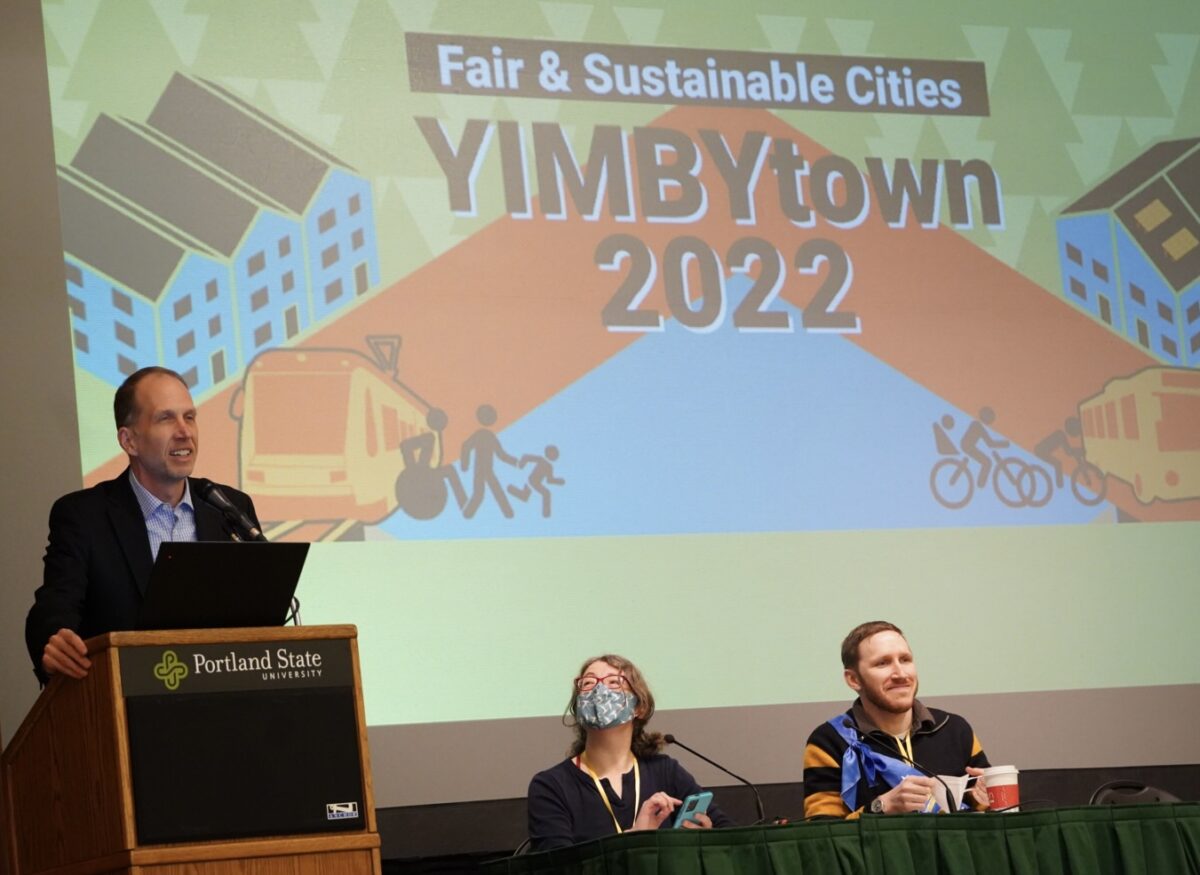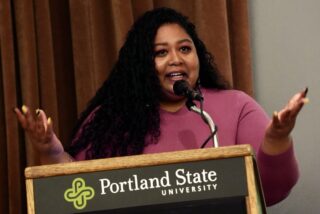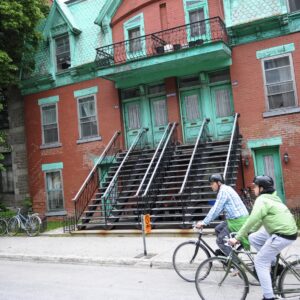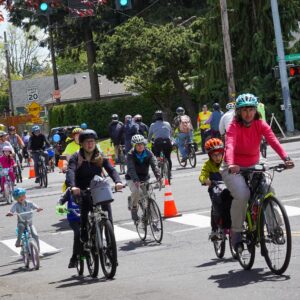
(Photos: Jonathan Maus/BikePortland)
A national conference for people who want more housing choices and denser cities kicked off this morning at Portland State University.
“We have proved ourselves effective, we have proved ourselves influential, even powerful. We have begun to win!”
— Alan Durning, Sightline
YIMBYtown, as in “yes in my backyard” is a counter-movement to the scourge of NIMBYism that has prevented new housing and encouraged sprawl nationwide. The first YIMBYtown was held in 2016 in Boulder and has been held two other times since. Portland was slated as the fourth host in 2020 but plans were scuttled when the pandemic took hold.
As conference-goers came in from the unexpected snowfall that blanketed Portland Monday night, they settled into an opening keynote that featured Alan Durning, founder of nonprofit think tank Sightline, and Portlander Candace Avalos, executive director of Verde, a community development nonprofit based in Cully.
Advertisement
Durning’s Sightline plays an instrumental role in progressive urban planning issues and is similar to BikePortland in the way it mixes journalism with advocacy (one of their lead authors, Michael Andersen, is our former news editor).
In his opening remarks, Durning struck a confident tone. But first, he painted a picture of the difference between YIMBYism and NIMBYism.
“In the NIMBY towns most of us come from, housing in dominated by scarcity, by conflict and competition, by winners and losers, by displacement,” Durning said. “But here in YIMBYtown, we’re about the opposite of all that… We want more homes, of all shapes and sizes for all our neighbors.”
“We want an abundance of housing,” he added. Notably, Durning was the third person to use that same “abundance” framing, which seems to be the phrase that elicits less opposition than “density”
In a place where housing is abundant, During said looking for a home feels more like, “Going to a well-stocked grocery store with no lines.”
He then rattled off a long list of political wins by YIMBY advocates in the past few years. Looking to rile up the crowd, he said, “We have proved ourselves effective, we have proved ourselves influential, even powerful. We have begun to win!”
Advertisement
“If housing is a human right, then we need to understand the other ways our human rights are being threatened by these systems.”
— Candace Avalos, Verde
Candace Avalos is an accidental YIMBY advocate who comes to the work with a passion born of her own experience as a young renter worried about housing stability. Introduced as a first-generation Blacktina and child of Black and Guatemalan immigrants, Avalos told the crowd she wants them to expand their lens.
While running for a spot on Portland City Council in 2020 (she won 9% of the vote and lost to Carmen Rubio), Avalos said she realized how many Portlanders like here were “living on the brink” due to rising rents, declining wages, and lack of housing availability.
“It just really clicked for me how much these issues were connected to all issues of livability,” Avalos said.
Intersectionality is at the core of Avalos’ perspective. To her that means saying “yes” to better housing must also take other systemic issues into account like racial, environmental and social justice. “If housing is a human right, then we need to understand the other ways our human rights are being threatened by these systems.”
After hearing a rousing applause the large crowd of attendees is off to three days of conversations and activities aimed at changing a raft of policies that include not just housing but topics like transportation, parking, and many other things that shape urban landscapes.
If the conference is as effective as the YIMBY movement has been in the past few years, organizers will be very pleased.
In the words of Durning:
“If anyone had predicted at the last YIMBYtown that single-family zoning would be essentially gone in California, and Connecticut and Oregon, and on the ropes in Washington, and a number of other states… I think we would have rolled our eyes at the naiveté.
But that is exactly what’s happened. YIMBYtown is winning. We are winning. Not quickly enough. of course not. But we have changed the debate profoundly and we are changing the world.”
As we reported last week, this conference has a strong focus on transportation. Stay tuned for more coverage!








Thanks for reading.
BikePortland has served this community with independent community journalism since 2005. We rely on subscriptions from readers like you to survive. Your financial support is vital in keeping this valuable resource alive and well.
Please subscribe today to strengthen and expand our work.
And when the tree canopy and habitat for insects and other small furry creatures is sacrificed to build all these housing units in every available free spot in the city then what?
Watch organizations act with indignation when reports come out that the trees are disappearing, and city wonks act all surprised and can’t figure out why.
I have a big piece of empty property that makes up my back yard, but I will NEVER EVER put up a living space there as long as I have this property. That open space was the driving factor why I bought this house/yard. Sitting out in a chair on the lawn watching the hawks flying around overhead is worth it to me.
What’s done with it after I’m gone won’t matter to me at all.
If you don’t build new housing in the city, you end up with development on the fringes that demolishes better animal habitat, cuts down even more trees, and leads to more driving.
But at least you are willing to admit that you don’t care about the well being of future generations.
Urban trees and greenspaces also matter for the wellbeing of future generations, probably even more than another few class A apartments that will make no difference in the face of what is effectively infinite demand.
And likewise, the loss of a few additional urban trees will make no difference in the face of runaway climate change and the eventual extinction of the human race.
Yes, you are right — nothing Portland can do will have much impact on climate change. But trees do make a big difference locally to the people living around them, which is why most people value them.
Watts, we lost a lot more trees to the snow Monday than we’ve lost to apartments. The majority of Portland’s new housing stock has been built in downtown and places like Slabtown. RIP stipulates that the new buildings have to have the same lot coverage as existing buildings on the site. I agree that urban tree canopy is deeply important. I moved here from Chicago, a city with a notably spectacular urban canopy – far better than our quite frankly. But Chicago, as you may know, is a dense city. And its tree canopy is at its best in some of its densest residential neighborhoods. The two are compatible. The best thing Portland could do for tree canopy would be to underground the power lines and replace street parking with street trees. Those aren’t cheap options by any means, but they are effective. Relying on private property owners to maintain the urban tree canopy is a dicey proposition in the long term. Tree provide a diffuse benefit to the city, and their maintenance should fall primarily on the city itself and on its common land.
You’re right! ~300 trees are lost to make 1,500 units of sixplexes, vs ~18,000 trees to make 1,500 units of detached single family houses. It’s like the homelessness issue: folks are happy with policies that encourage deforestation, they just don’t want to see it right in front of them.
And the concept that all urban infill involves an apartment building replacing a single family home & yard is wrong. Ian MacKenzie posted a good twitter thread about this a couple years ago. Increasing multifamily construction tends to increase urban tree canopy, while maintaining single family zoning does not.
You’re saying that as if building homes elsewhere has no cost. The options are to build on city land, forest, or farmland. I like having a dense city to protect forest and farmland. Love that we can enjoy farmers markets and hikes in the gorge because they are protected by an Urban Growth Boundary that does mean that people are going to live in better proximity to shopping and services and with more options for getting around than just driving. Saying that we can’t build in the city if there’s a tree is literally not seeing the forest for the tree.
Growth cannot continue to infinity; at some point it has to slow (and it has started slowing, with new development becoming increasingly expensive). We may not be there yet, but we can’t just keep building forever. After we’ve cut down all the urban trees to make room for new development, then what? Build in the parks?
A healthy city needs more than just 1 BR apartments, and we will come to regret our current vogue for urban monoculture, as the hand-wringing over our lost tree cover suggests.
One of the major causes of sprawl is a chronic lack of affordable housing in the urban center. Building more class A “luxury” housing (e.g. YIMBYism) is a recipe for further increases in urban sprawl.
You’d be well served to watch some of the videos from the conference, and to pick up a copy of Shane Phillips “Affordable City”.
“The options are to build on city land, forest, or farmland…”
“If you don’t build new housing in the city, you end up with development on the fringes…”
This is the essence of why this zero sum YIMBY framing is so unhelpful. I don’t agree with this at all. Why always and forever treat growth as given, as sacrosanct. The long term problem isn’t not enough housing/land/climate/energy; it is too many people, and the corresponding exponential growth in demand for environmentally untenable goodies. Many of the comments above hint at this but none come out and say this.
Alternatives to Growth Oregon used to champion this cause, and very eloquently. Of course now as before it is hard for people to talk about uncomfortable things, easier to just pretend we can have our infill and pristine green spaces too – and all will be well.
People are generally uncomfortable talking about “final solutions” to population problems. Oregon has decent publicly funded healthcare, and generally good access to reproductive health, so I’m not sure what you are looking for here. We can’t control what happens in other states.
What I am looking for?
I am looking for a frank conversation about the whole picture, not always and predictably only about the half concerning supply. Of course I am not holding my breath. I’ve bee. trying to encourage this conversation here on bikeportland for maybe 15 years.
You say people are uncomfortable. Sure, I get that. In fact I said so in my comment. But that doesn’t mean we aren’t on the hook to do it anyway. Maybe we should talk about it precisely because it is easier to avoid the issue, pretend it can be avoided without dire repercussions. Do you really think that we are better off avoiding uncomfortable issues? Is that a way to make policy?
As for ‘we can’t control what happens in other states,’ that seems like a red herring, or, alternatively, an excuse to sit on our hands. There are plenty of interesting, important, non-xenophobic things we could talk about, champion, legislate. Who knows if we did that—and the sky did not fall—maybe other states would even take. note and copy us? We once invented the gas tax here too, remember.
What are you advocating? You are always so obtuse. Do you want zero growth population in Portland with zoning laws?
I like the idea because I already live here and we can do that, Santa Barbara California basically did that 30 years ago.
It is fairly expensive if you want to move there.
If you want Zero US population growth it is slowing and the pandemic has slowed it more but we can only have zero growth if we completely stop all immigration which is not really practical but I would like to hear your ideas.
As for the world, Good luck.
What is your plan?
“You are always so obtuse.”
Really? Gosh. I thought I was pretty clear.
Or maybe you wanted a fully fleshed out plan?
I am not nor do I aspire to be The Leader Who Has Plans Others Shall Adopt. I believe in democratic decision making, frank discussion, open minds.
To that end I think we would do well to
– come to grips with the biophysical, cultural, economic impossibility of continued exponential growth, and the consequences of our treating growth as inevitable;
– find and implement non coercive ways to reduce population growth;
– stop pretending that by flattering Middle Class tastes with green consumption alternatives we can do end runs around the tricky problems of our time (Energy Efficiency, Recycling, Hybrid Cars, EVs, Wind Energy, etc.);
What Alternatives to Growth Oregon discovered is that if you ask the right questions most people already understand that exponential population growth is not in their best interest, does not lead to things they want, to improvements. We don’t, by and large, need to convince people of this; we need to find ways to reorganize our society around these insights. Stop subsidizing, rewarding, assuming growth in everything, including population.
We give child tax credits, but no credits to adults who don’t have children;
We give tax breaks to people who buy EVs, but not to people who get by without any car, and so on and so forth.
Let’s have robust discussions about all the ways our system produces, requires, rewards outcomes that don’t make sense, and then think of ways to reward what does make sense, what improves quality of life.
That was no answer.. I expected it. Blather, nothing concrete at all.
Do you favor closing the borders completely?
The birth rate is slowing now, how fast do you want to speed that up and what do you propose?
A lot of sentences that mean nothing.
You’re a funny one.
Maybe we just approach things differently?
Why does it matter so much to you what specific strategies I may or may not like? As I said above, this isn’t how collective decisions, how policy, is made in this country. Let’s have a conversation first, eh? Maybe ‘concrete’ isn’t the best approach to a subject that is acknowledgedly uncomfortable?
Do you favor expanding the Urban growth boundary?
Do you favor not building or expanding bridges or highways?
Do you favor more or less density?
Your “questions”and discussions are exhausting.
“Do you favor expanding the Urban growth boundary?”
No. But why does my opinion matter so much to you? This issue is. ich bigger than my opinion or your opinion.
“Do you favor not building or expanding bridges or highways?”
That is correct.
“Do you favor more or less density?”
To me that is not a useful framing at all. And if instead of being exhausted so easily you had read what I wrote above I think you would know this already. Density, like efficiency, is a ratio: it tells us nothing about where this is all going, what sort of a world we want/don’t want. Dense cities are or can be great, but density without some understanding of carrying capacity, of overshoot, is meaningless.
“Your “questions”and discussions are exhausting.”
Well so far you’ve stayed engaged, so it must not be so terrible.
Love to see it!
I’m all about density and good planning. The real issue is the lack of a good active transportation infrastructure. East Portland received 50% of the population growth in Portland between 2000 and 2010, but no active transportation improvements. Why do we continually pay for the rest of the city’s bike infrastructure yet have to wait years for sidewalks and low stress bike facilities?
East Portland has more available land for residential infill than any sector in the city yet, arguably the worst active transportation infrastructure.
The City of Portland has not been proactive when it comes to basic infrastructure. Build the infrastructure and density will follow. The City of Portland increased the density, but you have to beg for active transportation improvements.
Citation needed.
https://www.portland.gov/sites/default/files/2020-02/epim-final-report.pdf
I stand corrected. Only 44% of the city’s population increase occurred in East Portland from 2000 to 2010.
https://www.portland.gov/sites/default/files/2020-02/epim-final-report.pdf
Page 11.
But east Portland has seen active transportation improvements. I know, because I ride on some of them nearly every day. Or are you just looking at the period between 2000 and 2010, and ignoring everything that happened after?
East Portland received no active transportation improvements in that time frame.
With the East Portland Action Plan, the East Portland In Motion Plan, the Division/Midway Plan and the 2030 Bike Master Plan East Portland has received roughly $180 million in funding for improvements, yet a significant portion of those projects funded (roughly 75%) have not been built, or finished. We are still waiting.
Not many upvotes?
Hmmm…
Inner Portlanders with “black lives matters” and “kindness is everything” signs in their yards prefer to ignore the festering wound of injustice that is East Portland’s built environment.
Reposting my question to this page:
Can anyone …attending the YIMBYtown conference report back on how successful the very public effort that Trimet / CoP did to address pre-gentrification mitigation in regards to the MAX Yellow Line construction in the early 2000s? My memory, there was a lot of public communications and “effort” to prepare small business owners with financial planning (and purchase their buildings etc.) to get ahead of expected displacement trends that light rail investment typically creates. But I don’t think I saw any post project report or assessment…
[Though the Interstate commercial corridor took an extra 10 years to ‘pop’ vs bike transit corridors like Mississippi that did it without Trimet investment.]
Does Bike Portland also receive millions in funding from real-estate speculators, including prominent Trumpist real-estate mogul, Clyde Holland?
https://www.seattletimes.com/seattle-news/politics/2-wealthy-donors-pour-cash-into-state-republican-races/
https://www.nwprogressive.org/weblog/2015/03/meet-tim-eymans-new-wealthy-benefactor-developer-clyde-holland-of-holland-partners.html
Hi soren,
No. Of course not! And I didn’t say we were the same. The word “similar” means we share some characteristics (the ones I mentioned), but not all. We’d love to find a million-dollar investor though! It would beat losing money every month, which is what we do now.
Soren, while you may be right that these creeps fund Sightline (certainly what you are implying) the articles you linked don’t say this. Why not site articles that do?
Sightline’s funding is normally kept secret but it has occasionally published donor information and “Up For Growth” has been one of their prominent donors.
https://www.upforgrowth.org/person/clyde-holland
I’ll dig around and see if I can find a social media capture that I saved several years ago. If not, I’ll direct you to someone who has the deets via email.
Up For Growth is, not at all coincidentally, a major sponsor of the Sightline-organized YIMBYtown conference and the CEO of Up for Growth is giving a keynote presentation:
https://www.sightline.org/2022/02/25/yimbytown-2022-tickets-now-on-sale/
Sightline almost never discloses their donors (for obvious reasons given their pro-real-estate development position) but they did reveal support from “Up For Growth” in the past. I did not capture the social media post but I’ll connect you with someone who has the deets via email.
https://www.upforgrowth.org/person/clyde-holland
“Up for Growth” is a major sponsor of the Sightline-organized Yimbytown conference and the fact that “Up for Growth’s” CEO was selected to give a keynote presentation is not coincidental.
https://yimby.town/sponsors/
https://yimby.town/agenda-at-a-glance/
Up for Growth has been deeply critical of tenant protections and of modest* reforms that incentivize affordable housing (e.g. inclusionary zoning).
*far too modest